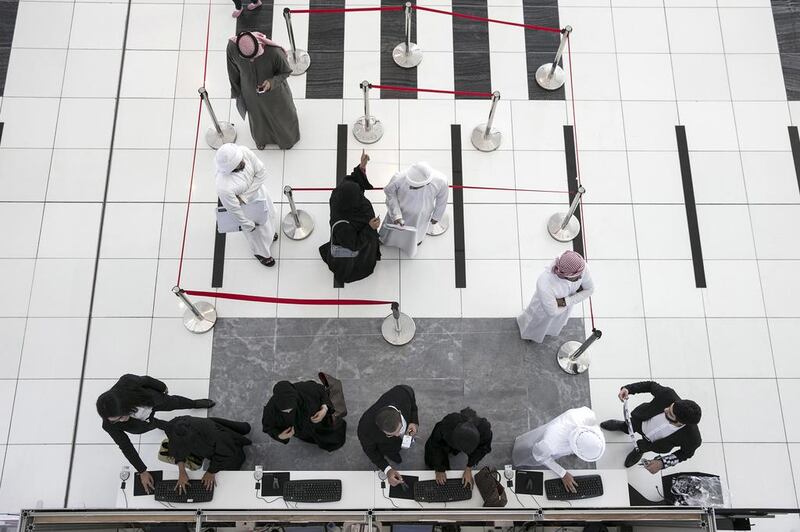ABU DHABI // Almost half of 500 companies surveyed say their Emirati employees quit within three years, posing a major challenge to Emiratisation.
Dr Rabei Wazzeh, executive director of the Knowledge Group, presented the findings of his national employment survey of public and private companies at the Eighth Annual Emiratisation Forum in the capital last week.
“It has always been the problem that UAE nationals, once they start a job, become a very hot target for other companies,” said Dr Wazzeh. “So once you find an Emirati in a job then all other companies are targeting him to attract him. They move jobs very quickly.”
Forty-six per cent of companies said the average employment of Emiratis was less than three years.
Nearly one in five companies, or 18.7 per cent, said Emiratis on average stayed between one and two years, while 17.3 per cent of employers said they quit within 12 months.
And 25.9 per cent of the companies surveyed said they had lost between 11 and 50 per cent of their Emirati workforce in the past year.
Moath Hussein, chief support services officer for Al Fahim Group, a private conglomerate with motor, property, hospitality, industrial and travel companies, said it was a struggle to convince young nationals to stay in their private sector jobs.
“One of the biggest challenges is retention – not in the big government corporations but in the private sector,” he said.
“You get a person and you train them, and in six months’ time or one year’s time, they have a lot of skills and capabilities that many fresh grads don’t have.
“So they get picked up and they are offered huge salaries in the government sector.”
Mr Hussein said that the public sector paid generous salaries to Emiratis, but the potential for long-term wage rises is often much better in the private sector.
“In the private sector, in the long run, they will be making better income because we are a variable pay company,” Mr Hussein said.
“I have employees who make loads of money, not on a fixed salary, on variable pay. One of our best salesmen is an Emirati. He got it in his head, he knew what it takes.”
The challenge is convincing young Emiratis to stick around long enough to find out their true earning potential, said Mr Hussein.
Souad Al Hosani, a young Emirati who gave up a lucrative government job to run her own company, which now employs about 30 people, said the trade-off had been priceless.
“Loving your job and showing up every morning to an office you enjoy, it’s an achievement in itself,” said Ms Al Hosani.
“Maybe I’m not a government employee, but I’m giving back to the country in a different way.”
Ms Al Hosani is in the process of recruiting retired Emirati professionals to work as consultants for private foreign businesses as part of an initiative her company is launching.
“Emiratisation is a very important aspect of every organisation in the UAE,” she said. “I’m not against having expats working in our companies. We have learnt a lot.
“But it is time that we Emiratis step up for our own country. It’s a time where we Emiratis are very qualified to achieve what we want to do.”
rpennington@thenational.ae






